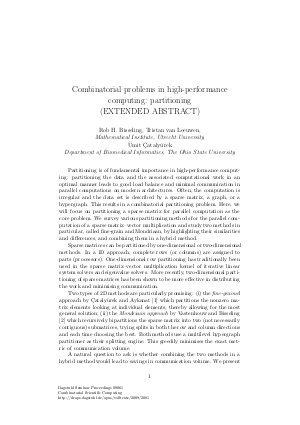Combinatorial Problems in High-Performance Computing: Partitioning
Authors Rob Bisseling, Tristan van Leeuwen, Umit V. Catalyurek
-
Part of:
Volume:
Dagstuhl Seminar Proceedings, Volume 9061
Part of: Series: Dagstuhl Seminar Proceedings (DagSemProc) - License:
 Creative Commons Attribution 4.0 International license
Creative Commons Attribution 4.0 International license
- Publication Date: 2009-07-24
File

PDF
DagSemProc.09061.6.pdf
- Filesize: 89 kB
- 5 pages
Document Identifiers
Subject Classification
Keywords
- Partitioning
- sparse matrix
- hypergraph
- parallel
- HPC
Metrics
- Access Statistics
-
Total Accesses (updated on a weekly basis)
0Document
0Metadata
Abstract
This extended abstract presents a survey of combinatorial problems encountered in scientific computations on today's high-performance architectures, with sophisticated memory hierarchies, multiple levels of cache, and multiple processors on chip as well as off-chip. For parallelism, the most important problem is to partition sparse matrices, graph, or hypergraphs into nearly equal-sized parts while trying to reduce inter-processor communication. Common approaches to such problems involve multilevel methods based on coarsening and uncoarsening (hyper)graphs, matching of similar vertices, searching for good separator sets and good splittings, dynamical adjustment of load imbalance, and two-dimensional matrix splitting methods.
Cite As Get BibTex
Rob Bisseling, Tristan van Leeuwen, and Umit V. Catalyurek. Combinatorial Problems in High-Performance Computing: Partitioning. In Combinatorial Scientific Computing. Dagstuhl Seminar Proceedings, Volume 9061, pp. 1-5, Schloss Dagstuhl – Leibniz-Zentrum für Informatik (2009)
https://doi.org/10.4230/DagSemProc.09061.6
BibTex
@InProceedings{bisseling_et_al:DagSemProc.09061.6,
author = {Bisseling, Rob and van Leeuwen, Tristan and Catalyurek, Umit V.},
title = {{Combinatorial Problems in High-Performance Computing: Partitioning}},
booktitle = {Combinatorial Scientific Computing},
pages = {1--5},
series = {Dagstuhl Seminar Proceedings (DagSemProc)},
ISSN = {1862-4405},
year = {2009},
volume = {9061},
editor = {Uwe Naumann and Olaf Schenk and Horst D. Simon and Sivan Toledo},
publisher = {Schloss Dagstuhl -- Leibniz-Zentrum f{\"u}r Informatik},
address = {Dagstuhl, Germany},
URL = {https://drops.dagstuhl.de/entities/document/10.4230/DagSemProc.09061.6},
URN = {urn:nbn:de:0030-drops-20818},
doi = {10.4230/DagSemProc.09061.6},
annote = {Keywords: Partitioning, sparse matrix, hypergraph, parallel, HPC}
}
